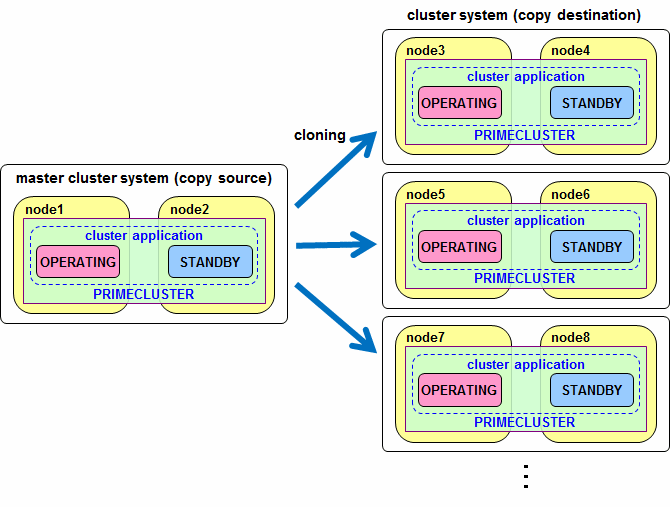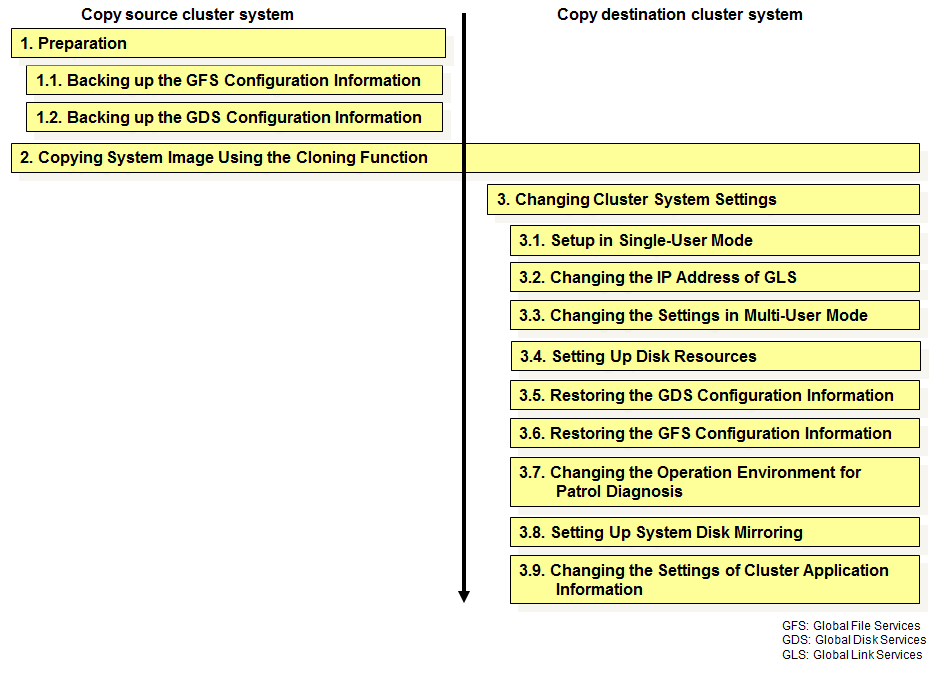PRIMECLUSTER allows you to configure a new cluster system by cloning an already configured cluster system.

The cluster system can be cloned in the following environments if the same OS version is used in both the copy source and the copy destination.
Copy destination | |||
Physical environment | Guest domain environment in Oracle VM Server for SPARC | ||
Copy | Physical environment | Y | Y |
Guest domain environment in Oracle VM Server for SPARC | - | Y | |
Y: Supported, -: Not supported
Copy destination | ||||
Physical environment | Guest domain environment in Oracle VM Server for SPARC | Oracle Solaris Kernel Zones environment | ||
Copy | Physical environment | Y | Y | Y |
Guest domain environment in Oracle VM Server for SPARC | - | Y | - | |
Oracle Solaris Kernel Zones environment | - | - | Y | |
Y: Supported, -: Not supported
Note
The following items are not included in the supported range:
Building a single-node cluster from multiple clusters (cases of which can be seen with Disaster Recovery and so on)
After building a single-node cluster, copying it to multiple nodes to build multiple-node clusters
Building multiple-node clusters by copying a node within the multiple-node clusters to the multiple nodes
Make sure that the sizes of disks managed by GDS are the same at both copy source and copy destination.
Before starting up the copy destination system, make sure that the NIC cables are disconnected or the copy source is stopped, or connect from the copy source system to an isolated network, taking care that there are no IP addresses in duplicate with the copy source system.
When you carry out cloning, you should follow the conditions of the cloning software/function (a flash archive for Solaris 10 and Unified Archives for Solaris 11) to be used.
Here, the cloning procedure is explained with the cases of cloning a cluster system of standby operation and a two-node cluster in the physical environment.
Procedure for Configuration by Cloning
The procedure for configuration by cloning in PRIMECLUSTER is as follows.
Figure I.1 Procedure for Configuration by Cloning

Note
If mirroring a system disk in the system of the copy source, the system disk mirroring in the copy destination is automatically canceled due to the functions of a flash archive and Unified Archives. Therefore, you must set it manually again.
The description of the steps in the following execution example, is given for building a cluster system with the following configuration.
Copy source | Copy destination | |||
|---|---|---|---|---|
Cluster Name | PRIMECLUSTER1 | PRIMECLUSTER2 | ||
CF Node Name | fuji2 | fuji3 | fuji4 | fuji5 |
CIP/SysNode Name | fuji2RMS | fuji3RMS | fuji4RMS | fuji5RMS |
IP address on Administrative LAN | 10.20.30.100 | 10.20.30.101 | 10.20.30.102 | 10.20.30.103 |
IP address for cluster interconnect | 192.168.0.1 | 192.168.0.2 | 192.168.0.3 | 192.168.0.4 |
Physical IP address/hostname for GLS | 10.34.214.181/primecl01 | 10.34.214.182/primecl02 | 10.34.214.191/primecl03 | 10.34.214.192/primecl04 |
Virtual IP address/hostname for GLS | 10.34.214.185/takeoverIP | 10.34.214.195/takeoverIP2 | ||
GLS: Global Link Services